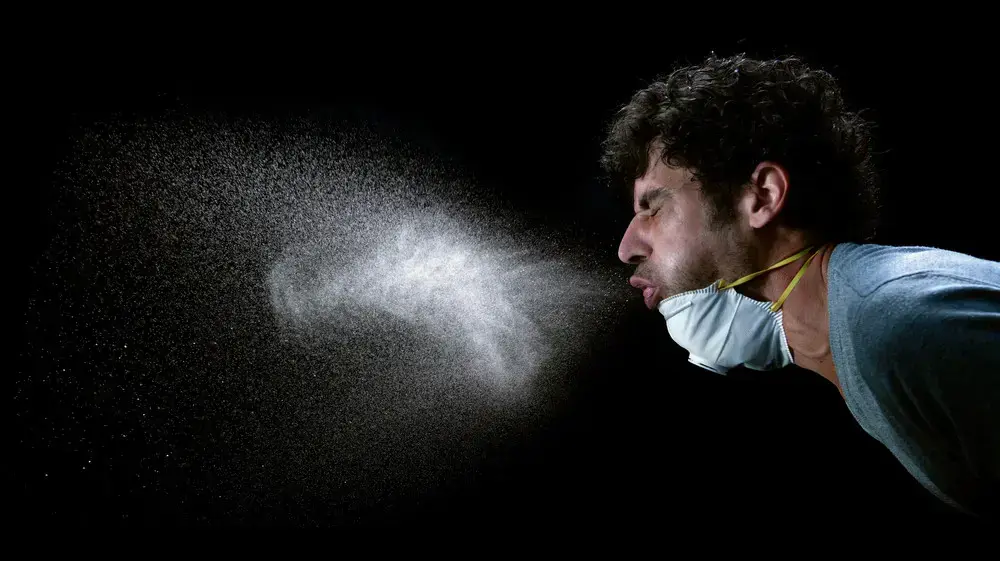Everything you need to know about winter diseases (Walla! NEWS system)
This year it seems that the winter viruses, especially the flu, are hitting harder than in previous years.
The reasons for this are varied, but Corona and the fact that we have all been wearing masks in recent years probably have a considerable effect on the intensity of the diseases.
But we are here today precisely to talk about those who have already been infected with the flu or another winter virus, and have already had a few particularly difficult days of tissues, tea and a lot of paracetamol.
Those people usually find that even when they have managed to get through the acute illness safely, they still suffer from a nagging cough that refuses to go away for days on end.
So we looked at why the cough continues even though the inflammation has passed, and what can be done about it?
How long does a cold usually last?
A cold usually lasts between three days and a week in adults, and around ten days in children.
Usually, the symptoms last to one degree or another for up to two weeks.
Can a cold cause more serious problems?
Mostly no, but in some cases - yes.
People at the extremes of age (toddlers and the elderly) are at increased risk of complications, as well as people with chronic respiratory diseases and immunocompromised people.
In general, a viral infection (cold or flu) may lead to complications such as pneumonia, bronchitis, ear infections, worsening of asthma symptoms and sinus infections (sinusitis).
More in Walla!
Green snot?
This is what the color of your runny nose says about your health
To the full article
Is a cough after a viral infection normal?
Coughing is a critical part of the body's defense against disease and it is known that it helps the body in cleaning the respiratory tract from harmful agents (such as bacteria) and from various substances.
Although the cough is common in cases of respiratory infections that are usually caused by viruses, it usually disappears shortly after the acute infection has passed.
At the same time, in some cases the cough may continue even after the fever, muscle aches, weakness and headache have passed.
Why does the cough persist long after recovery?
A cough that continues even after the viral infection is called a post-viral cough and can appear as a dry cough or a productive cough (if accompanied by sputum).
The cough itself may also be accompanied by throat irritation and hoarseness, or a feeling of a constant need to cough.
Any infection in the upper or lower respiratory tract can cause a cough.
Sometimes this is due to an inflammatory process and sometimes from side effects such as post-nasal drip which stimulates the cough reflex, laryngitis which causes irritation of the pharynx and the need to cough and sometimes even from aggravation of gastric reflux symptoms which causes an increase in gastric fluids through the esophagus and stimulation of the cough reflex.
Does the cough not go away?
A man coughs (Photo: ShutterStock)
In most cases it is not a dangerous phenomenon and it usually goes away on its own.
At the same time, acute infection can also worsen chronic respiratory diseases such as asthma or COPD, and sometimes the cough requires special intervention.
What should you do?
If a cough appears after a viral illness, it will usually go away on its own, if you are patient enough.
In cases where the cough is accompanied by a fever, a chest x-ray is usually required to rule out pneumonia that can appear as a complication of viral infections (both viral pneumonia and bacterial pneumonia).
Although most of the time the cough will go away on its own, the symptoms can be alleviated with salt water inhalations.
In more severe cases, you can get a prescription for inhalations of smilers and bronchodilators.
In cases where the problem is due to multiple post-runny noses, local treatment sprays to dry the runny nose or anti-inflammatory sprays can help reduce the post-runny nose and improve the cough.
can relieve symptoms.
Tea (Photo: Giphy)
Of course, drinking warm liquids, such as tea or soup, can ease the symptoms.
Honey (for children over one year old and adults) was found to be effective in reducing cough compared to those who were not treated at all.
When the source of the cough is a sore and irritated throat, it is advisable to take local treatment to reduce the sore throat.
In general, avoiding smoking and exposure to polluted air is important during these stages.
And here are some more old-fashioned remedies that can help:
4 delicious foods that are also an effective cough remedy
3 types of tea that can relieve a sore throat
If the cough does not go away?
In order to clarify a chronic cough, it is necessary to see a doctor, who, based on the symptoms and a physical examination, will decide on the continuation of the necessary investigation.
Sometimes if treatment does not improve the symptoms, imaging of the lungs using a chest x-ray or CT lung is necessary (especially when it comes to smokers).
In situations where there is a suspicion that it is a chronic lung disease, it is necessary to complete a test of lung functions and consult a pulmonologist.
If there is a suspicion that the source of the symptoms is from the digestive tract, antacid treatment can be given and if there is still no benefit, consult a gastroenterologist to rule out inflammation of the esophagus and, if necessary, also measure the degree of acidity in the esophagus over time.
health
my health
Doctor, what have I got?
Tags
cough
the flu
cold
I'm just asking

